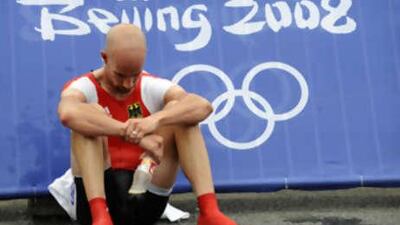LAUSANNE // The International Olympic Committee (IOC) will retest all doping samples from the Beijing Games to check for traces of a new blood-boosting drug. The unprecedented move, announced today, is designed to search for a banned substance that was only recently detected during retesting of samples from the Tour de France. The Beijing samples - across all sports - are being sent to the World Anti-Doping Agency (Wada) accredited laboratory in Lausanne, Switzerland, the IOC spokeswoman Emmanuelle Moreau said.
The IOC conducted more than 5,000 drug tests during the Beijing Games. The samples will be reopened and tested for Cera, a new generation of the endurance-enhancing hormone EPO. The substance boosts an athlete's performance by increasing the number of oxygen-rich blood cells. Details of the testing procedure are under discussion with Wada, Miss Moreau said. The decision comes after a new laboratory test used by the French Anti-Doping Agency detected Cera during retesting of samples from Tour de France cyclists.
The original urine tests had raised suspicions but proved inconclusive. "It's very good. It allows us to confound the cheaters," the Tour de France chief Christian Prudhomme said yesterday. "What's being done at the Tour de France has never existed in the world of sport." Officials confirmed yesterday that the German rider Stefan Schumacher, and the Italians Riccardo Ricco and Leonardo Piepoli had tested positive for Cera during this year's Tour. The three riders combined to win five of the Tour's 21 stages.
The IOC vice president Thomas Bach said yesterday that the future of men's road cycling in the Olympics could be threatened unless the sport cleans up its act under the aegis of the international cycling union, or UCI. If the entire sport does not pull together to improve the situation "then you have to consider giving men's road cycling a pause" from Olympic participation, Mr Bach told The Associated Press.
In a statement issued today, Mr Moreau said: "The IOC will continue to support the UCI - and any other international federation - as long as it is deploying meaningful and credible means and efforts to fight against doping." The IOC disqualified six athletes for doping during the Beijing Games - the Ukraine heptathlete Lyudmila Blonska, the Ukrainian weightlifter Igor Razoronov, hurdler Fani Halkia of Greece, the North Korean shooter Kim Jong Su, the Spanish cyclist Isabel Moreno and the Vietnamese gymnast Thi Ngan Thuong Do. Three other cases are still pending. The IOC have given the Belarusian hammer throwers Vadim Devyatovskiy and Ivan Tsikhan until Oct 17 to provide more information explaining why they tested positive for testosterone.
A decision is due shortly in the case of the Polish canoeist Adam Seroczynski, who tested positive for clenbuterol. *AP

